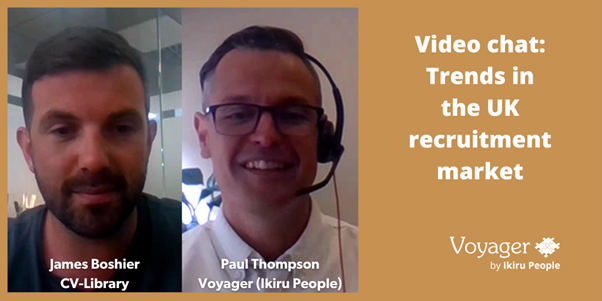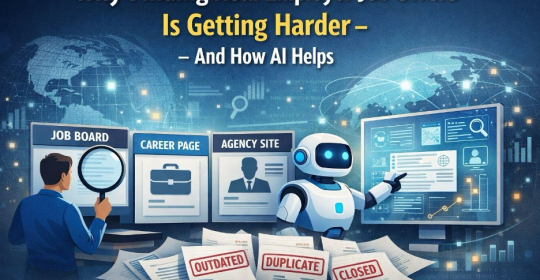Paul Thompson, Sales & Marketing Director at Ikiru People, supplier of Voyager Infinity Recruitment CRM, and James Boshier, Head of Partner Success at CV-Library, get together in this video chat to discuss current trends in the UK recruitment market, what it means for recruiters and candidates, and how the integration between CV-Library and Voyager Infinity can easily help recruiters identify more candidates.
Watch the video or read the transcript below:
Trends in the recruiting market - Voyager/CV-Library conversation from Voyager Recruitment Software on Vimeo.
James Boshier: Hi, I’m James Boshier, Head of Partner Success at CV-Library. And today, I’m joined here by Paul Thompson from Ikiru People. Hi, Paul!
Paul Thompson: How is it going, James? Good to see you.
James Boshier: Thanks for joining me today. And I think in celebration of the partnership between CV-Library and Voyager, it’s a great time to catch up, and to share some thoughts and ideas on things we’ve seen in the market and catch up on trends we’ve seen for recruiters.
Paul Thompson: Couldn’t agree more. So much has changed in the last 4 or 5 years, not mentioning the P word. If you think about the things that we talked about, only just a couple of years ago, it’s almost gone completely in the other direction, hasn’t it? So, yes, lots of change, I completely agree.
James Boshier: Yeah, absolutely. And we got the P word (pandemic). We’ve also got the B word (Brexit) that everyone seems to have forgotten about. I’m just wondering what the next word is going to be. As far as what the first question is about, what market trends are we seeing at the moment, to build on what you just said, there’s been a massive change in the last 12 to 18 months. And all the headlines that we’re seeing in the news are massive talent crisis in particular industries really struggling to find and hire people. And it’s been quite a challenging time for recruiters, I think it’s fair to say at the moment, isn’t it?
Paul Thompson: I’ve been here for over two decades up and working here at Voyager, selling recruitment software. And I think, if you look at what Voyager was in the early days, it was a place to dump data. You had a door, people walked in and registered on a piece of paper.
And when the job boards came along, and when the likes of CV-Library entered the world and changed it for the better, we’ve gone from a world of “there’s too many candidates” and having a predominant shop front for people to come in and meet you in, to virtually everything being online. And I think the pandemic really pushed that.
You know that the adoption of technology we saw was huge when the pandemic came along because they had to, rather than necessarily they wanted to. Even if you look at the conversations we had, when we first started our relationship between Voyager and CV-Library, recruiters had a valuable data set that they’d worked on for many years to grow and look after and stay very, very close to.
And dipping into CV-Library or LinkedIn was seen as “well, maybe there’s some stuff I don’t know about”, and I think that has changed. Now, it’s a case of having to be connected to the data, wherever it is now.
And obviously, if it’s in your CRM that’s great, and people can get close to it, but I think they will always have an eye out on a separate database, and pandemic has been a real driving factor for that.
When the pandemic came along, I think the conversation was around “there are no candidates that wants to move because they’re on furlough and they don’t want to leave, but they might want to leave”. So, maybe a second job, but it was all very, very messy and there was a lot of mystery.
And now it’s almost the opposite. It’s gone from “there’s too many candidates, what you want to do with them?” to “there aren’t any candidates, what am I going to do with my time?”
And that’s the trend that we’re seeing, and it’s literally gone from one to the other in 18-24 months.
James Boshier: Yeah, absolutely. And I don’t know if you remember this about me Paul, but I absolutely love some stats. Here’s one I made earlier: the number of open vacancies in the UK at the moment is around one point 1.3 million, which is insane. And I think I’m right in saying that’s actually just more than there are unemployed people. So, if every person that’s currently unemployed got a job, we would still have a problem.
But combined with that, unemployment is at 3.8, 3.7%, and that’s lower than it’s been since the mid-70s, since some of the proper records began. So, it absolutely is not surprising that people are having to do more and more to try and find those candidates.
A few years ago, it was very common that when you asked recruiters where they find their candidates, it was a mixture of “in my CRM, from my talent pool of candidates I have spoken to in the past” and applications to job vacancies that they posted.
And because there’s less people looking, those places aren’t actually being as fruitful. So, there’s lots more people using CV databases like hot switches. Great from our perspective, but people also getting creative and otherwise, more and more referral schemes, social media posts to try and get a good brand following… it’s been a really interesting couple of years.
Paul Thompson: One of the things we’ve seen our end is that recruitment companies were quite focused on finding their niche and networking with people in their field. If you were a sales agency, you would do lots to engage with salespeople and you’d recognise that maybe good salespeople who are well paid and looked after might not be looking.
So, you would connect on LinkedIn to maybe tap them up every now and again for a little chat. But I think there’s a lot more in that spectrum now, isn’t it?
It’s almost like “I’m not actively looking, but…” and then there’s “I’m not actively looking, but I’ve got a CV and you can have a copy of it” and then there’s “I haven’t got a job, can I get one?” And if you are in the market now and looking for a job, you’re choosing not to work if you don’t want to. There’s not a lot of excuses for not working now.
And I think if I consider myself, if I hadn’t been here for as long as I have, if I was to get fired, I’m pretty confident I could get a job within a week doing something, maybe not what I want, but I can definitely get a job. Whereas, for me to leave, I’m going to need to find something quite unique to my taste. I’m going to look at the market. I’m going to look at jobs on a job board and a website like yours. And if I do need to take a step further, it’s very easy for me to then upload a document, send it to CV-Library, and get a few specialists in that niche, recruiters just talking to me.
So, I think recruitment is a service now. I mean, it wasn’t before. It was “you’re either unemployed or you’re not”. But now, people think hard about their next move and, you know, there’s huge opportunities. There’s lots of growth, there’s no candidates, and it’s driving ridiculous pay increases.
We’re seeing some of those challenges in our business here. To find the right talent is a multi-pronged attack now, you’ve got to do a bit of everything.
James Boshier: It would be interesting to know if you’ve seen any of the crazy perks with job adverts. In our position, we get quite a lot of visibility on thousands of job ads, and I’ve seen quite a lot of weird and wonderful ones. And I don’t know if you’ve seen any sort of perks on jobs listings that tickled your fancy.
Paul Thompson: I think there are a few, I mean working from home – I don’t want to say it’s been normalised now, but I can imagine if I was looking for a job, opting for an office-only role would have to be quite an exciting opportunity for me to consider giving up the flexibilities that I’ve become accustomed to, primarily because of the pandemic. When the pandemic hit, we had to work from home.
For our company, everyone’s got a hybrid environment. So, all of a sudden, looking for another job that’s not the exciting thing, but, you know, half-days on Fridays, work as much as you like, unlimited holiday.
I mean, I still like the fact that we have a fruit bowl here but, you know what I mean: it’s changed, and we’re seeing all sorts of things. It used to be an annual Christmas party and now, companies are having monthly social attractions and things like that.
So, I think if you recognize that you can’t necessarily afford to pay enough to get the candidate you want, then it is going to be a case of what is going to motivate someone to move? In the olden days, it was “there’s your desk, there’s your phone and you might get a company car after five years”, but now everyone’s got Uber, everyone’s got flexible working, we would hope everyone’s got a nice work environment with a nice, air-conditioned office.
I think if you are looking for a job now, then you can afford to be a bit more fussy than you would have been. And I think if you’re in the recruitment sector, you’ve got to employ all of the skills at your fingertips to get in front of those people.
Sticking an ad on a job board will attract the people that are looking at it. But what can you do to engage with people once you’ve got their data? How do you stay close to them? How do you appeal? Not everyone is motivated by money as well, isn’t it? That’s the thing. It was like “you get paid and your holiday and that’s it”, but now I think people look at work-life balance.
James Boshier: So, the two things that caught my attention: there’s one where it is work from anywhere, it’s encouraging you to spend at least one month a year, working from a different country, so on their careers page, it’s photos of their entire team working from the most exotic place possible. So that actually turned into a bit of a competition. Here’s the team of 20, Fred’s up a mountain, Jim’s on the beach, Jenny is doing a cycle tour around, wherever. So exactly as you say, it’s not always money.
The other one which I found quite interesting: I was reading an article about how many people bought dogs during the pandemic, when everyone’s struck at home. Now, people are still working remotely, but it’s more of a hybrid situation. So, we’ve seen more and more job adverts advertise “dogs welcome in the office”. And I know that’s kind of always been a thing but actually, more companies appear to be doing that off the back of everybody buying dogs during the pandemic and suddenly realising working from home five days a week isn’t necessarily what everybody wants to do all the time.
Paul Thompson: I saw an interesting one a few weeks ago, and it said “degrees not compulsory”. You don’t often see that on a job spec, it used to be “required minimum degree”.
From sort of a diversity perspective, if people aren’t going to university now, then you’re going to limit your pool as well. So, it’s not just where you work and the perks, but it’s the type of person that your advert is designed to appeal to. And in the olden days, you used to write a job spec and it would be 300-500 words long because you wanted to write everything to make it sound exciting, but nothing to put someone off.
Now, it’s almost like, “this is our company, this is why you should work for us, be part of the team”. I think it’s interesting that the actual job description bit on an advert now is maybe only a third of the of the copy. You read more about the company and what it’s like to work here with links to videos of “meet the team”.
I mean, some of the conversations I’ve had, I’ve actually felt like I’ve been in their office, because there is so much content out on the web about them. You quite often see interviews about people in their first week and now a year on from joining Voyager, this is what it’s been like…I think people are much more creative than they used to be. Recruitment has changed beyond all recognition in the last five years.
James Boshier: I’m guessing when recruiters that are actually using a CRM like Voyager, there is potential for some help: email templates for sending follow-up messages to candidates. If I go back 20 years or so, an average job hunter would set aside an afternoon. They would search within the job boards, they maybe even look in the newspapers, and it would be one large chunk.
Whereas what we’re seeing now is the job seekers are doing little and often they’re browsing for a couple of jobs at lunch. They might save them and come back to apply later. They might do some research into the company, so I’m sure CRMs at that point really help to keep on top of that.
Paul Thompson: That’s what we’re finding. Again looking back to the olden days, you’d get a CV, it would go in your database, you’d search it, it would be three months old, and even the recruiter would go, “wait, it’s three months old, I need to find someone else”. Sales nurturing is really what it’s all about now. Is the equivalent of sticking something in your Amazon basket, and then being emailed a voucher to come back and check out.
That’s exactly what we’re doing with our CRMs now. And, in fact, we’re finding that there’s better engagement if you email someone 90 days after they send you their CV to see if they’re still looking, because when they first send it to an agency, they might be sending it to 30, and they get a phone call straight away.
But if they haven’t found a job in 30 days’ time, maybe it’s because that pension is a bit more important, 50 days holiday is something I can achieve, four days a week is something I want. So, maybe they say no to the quick impulse buy but they take a more educated view on it. I mean that the life of a candidate now is for life. If you’re in a specialist recruitment field, the age of the CV isn’t the thing that you should be searching on now.
When you first got that applicant into your CRM, maybe they applied for a junior sales role. Well, how long does it take a junior salesperson to become a sales manager and an area manager and a sales director?
And if you know that’s 12 months, 26 months, 42 months, 5.5 years, then you should be using your CRM to line up calls and conversations to re-engage. A bit like you would have sent a birthday card in the olden days but with a much more personal thought. You can do birthday cards still. But I don’t think they’re quite as hot as they used to be.
James Boshier: One of the cool projects that we did last year was exactly on that, around looking at how long it takes a junior sales exec to become a sales manager. We’ve actually done that by looking at millions and millions of anonymised CVs to look at when you’ve got that career history to cover the difference in the dates.
And then, some of our clients were using that to send nudge campaigns to those candidates to say, “by now, you should have three promotions and be earning £70,000 a year. Are you interested, come have a chat with us and see what we can do for your career”.
And I think it’s those sorts of approaches where recruiters are going to really thrive and succeed in the current market. And the people that are just churning out the same ways of attracting candidates as they were doing two years ago are probably going to struggle, if I’m honest.
Paul Thompson: I’ve had a recent conversation with a finance agency who were originally a very niche payroll agency. They would place payroll clerks in payroll department for finance teams. And that was their niche: a little bit of accountancy knowledge, know about P45 and P11Ds inside out. And they were they positioned as admin roles, but in a payroll environment. And what they’ve learned is that those payroll people have become finance managers, finance directors.
So, by looking at the data that was old, they’d actually found a niche within the data that they had. Few newsletters go out, fancy-looking website, it completely revitalised what was a failing business at the time, so yes, data is key at the end of the day.
I say all the time, people don’t buy Voyager because it’s a database, they buy Voyager because of what you can do with the data that you’ve got within it, unhiding that gem and digging out that little golden nugget is really what you need to do. You need to keep the funnel open to keep the door open, to keep the new blood coming in, but maybe recognise it’s not just about the CV. It’s about extending the life of that relationship, which might well start with the CV.
James Boshier: It’s probably good reminding what the actual integration between Voyager and CV-Library allows people to do, and I suppose just taking exactly what you’ve just said, it allows recruiters to search the CV-Library database alongside their own talent pool inside Voyager.
When you’re searching for your finance administrators that you last spoke to or registered four years ago, through Voyager you can search not only your own candidates, but also the 17.8 million or whatever the number is in CV-Library as well.
We normally get really good feedback from recruiters using the integration, because it just saves them time instead of looking in two different places, and all that manual importing and exporting of data. It’s giving people time to do what they need to win business and have those conversations with the candidates rather than clicking the buttons between two different IT systems.
Paul Thompson: I think we’ve done a particularly good job with the integration to CV-Library. We recognize that our pitch as a software company is that our product is the platform that you should spend your time in.
What I particularly like about it is, whilst on a CRM, you might search for specific-coded candidates, that is quality data that is known to you. So, you know, the sales and managing director from a software company that is in your local area. If, when you do that search, you’re running out of options, and you don’t have the volume of applicants that you need, or maybe you don’t have anyone… but there is that tab, you click one button, and it will show you the results for the search you’ve done.
So, on one screen, you will see what you’ve got in your CRM, that you should put your effort into getting to know, and nurture, and stay in touch with. But you can also have on the same screen the Voyager results alongside the people that you don’t yet know. It’s like the fishing pool that you might go into, CV-Library candidates that are the freshest out there, their CVs, they’re people that are actively looking for work. In certain sectors, it’s hard to beat.







